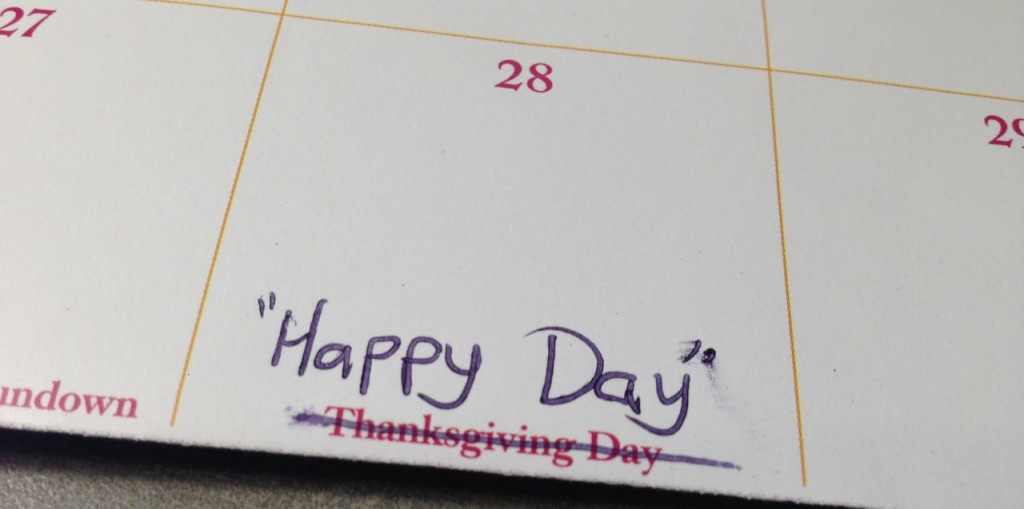On October 26, 1863, President Abraham Lincoln declared Thanksgiving a national holiday. George Washington, during his presidency, asked for “a day of public thanksgiving and prayer,” although at that time it did not become an official national holiday. Nevertheless, the idea of a day to focus on thankfulness has been a part of our history in the United States of America since our nation was founded. Now yet another Thanksgiving is around the corner with another Christmas almost upon us, and I feel it thus appropriate to focus this week’s Last Word on the idea of thanksgiving.
“Whereas it is the duty of all nations to acknowledge the providence of Almighty God, to obey His will, to be grateful for His benefits, and humbly to implore His protection and favor, and whereas both Houses of Congress have by their joint committee requested me ‘to recommend to the people of the United States a day of public thanksgiving and prayer, to be observed by acknowledging with grateful hearts the many and signal favors of Almighty God especially by affording them an opportunity peaceably to establish a form of government for their safety and happiness.” George Washington, October 3, 1789
The above statement is the opening paragraph of a “Thanksgiving Proclamation” given by President Washington. It’s hard to imagine our government making such a statement today. We hear the term, “Separation of Church and State” so often nowadays, but I don’t think people understand what the intent of our nation’s founders was when it came to religion. Obviously if Congress gave such a request to President Washington, they were not opposed to recognizing “Almighty God” as the source of all things good, nor were they opposed to prayer. They were, however, according to our Constitution, opposed to the government making laws “respecting an establishment of religion, or prohibiting the free exercise thereof.” They were opposed to government messing with the free practice of worshiping God, not to the worship itself. Thus it was actually the government itself that requested George Washington “to recommend to the people” to have a day of thanksgiving. It wasn’t an order forcing people to thank God, but a recommendation.
Thanksgiving by definition is, “the act of giving thanks.” And “thanks” is defined as, “a good feeling you have towards someone who has helped you, given something to you, etc.” So being that it is a “good feeling,” thanks is an emotion and something that cannot be forced upon someone, but can only be recommended, as Congress did.
But going deeper, thanksgiving by definition has to have an object. You can’t have thanks without a person to whom you are giving thanks. Are you getting it? Without an object, this definition of “thanks” turns into simply “a good feeling.” Without God as the focus of thanksgiving, we are simply happy that we are lucky. We are not thankful.
So to those who do not acknowledge God as the source of every good thing, Thanksgiving is reduced to being simply “Happy Day,” when they are essentially saying, “I’m so happy that I have so much stuff!” This is not meant to be a put-down, but it is the logical conclusion that you must come to if you do not give God the acknowledgment for what He has given you.
For those who recognize the reality that every good and perfect thing comes to us from our Father in Heaven, Thanksgiving Day is just that — a day of Thanksgiving. A day to remember and thank God for His faithfulness. And being that Thursday was instituted by our government, I think it is good to follow the recommendation of George Washington and to also acknowledge the “favors of Almighty God, especially by affording [us] an opportunity peaceably to establish a form of government for [our] safety and happiness.” So as you sit down around the table with your family and friends on Thursday, ask yourself, “Am I just happy … or am I thankful?”
“So don’t be misled, my dear brothers and sisters. Whatever is good and perfect comes down to us from God our Father, who created all the lights in the heavens. He never changes or casts a shifting shadow. He chose to give birth to us by giving us His true word. And we, out of all creation, became His prized possession.” (James 1:16-18 NLT)
Views – 164

 Follow
Follow